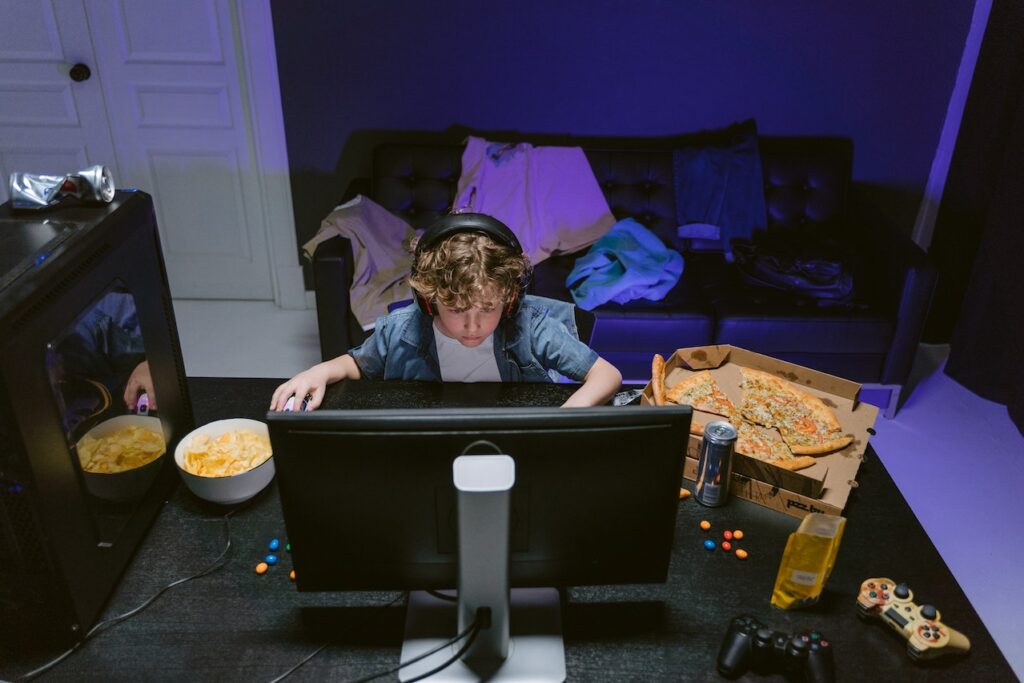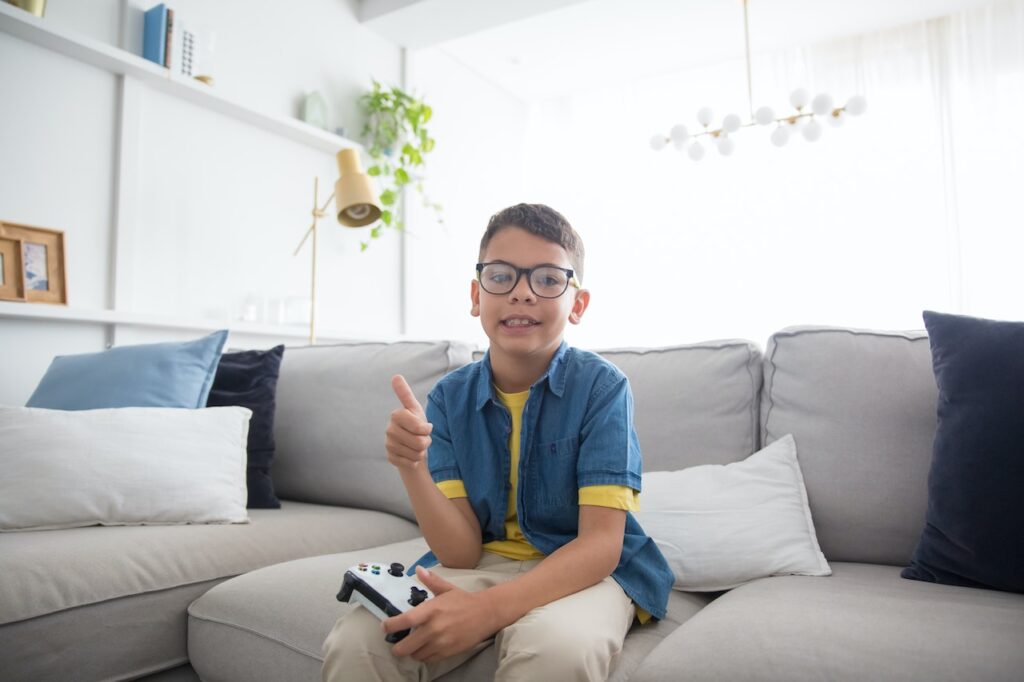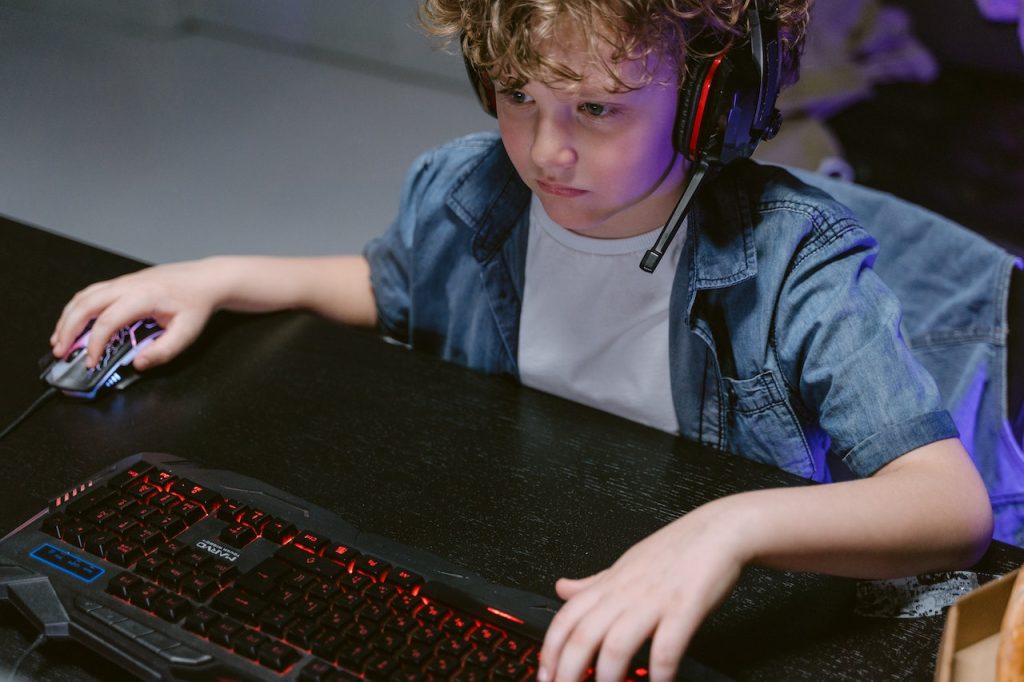Video games are amazing because of their creative graphics and the joy we all feel while we play. And kids especially enjoy playing their favorite video games.
Playing video games for fun in a controlled manner can have positive effects on our kids’ development and mental health. But do our kids control their time while playing video games?
The answer is no. They get addicted and play video games excessively, which makes us, parents, limit video game time. In this article, we’ll go over ways parents can set healthy video game time limits by age and ensure children’s safety.
Risks of Excessive Screen Time When Gaming

Statistics show that children between the ages of 12-15 spend about 11 hours weekly playing games. And excessive screen time when gaming can cause serious damage to our kids’ physical and mental health.
· Negative Effects on Physical Health
Being in a sedentary position for hours in front of screens can cause several negative effects on physical health, such as:
- Eye strain and vision problems;
- Headaches;
- Sleep disorder;
- Eating disorder;
- Bad physical condition;
- Neck and back pain;
- Lower immune system;
· Negative Effects on Mental Health
Excessive gaming can hinder children’s psychological development and cause mental health problems, such as:
- Anxiety;
- Aggression and violence;
- Mood swings;
- Depression;
· Negative Impact on Academic Performance
Excessive gaming can destroy our kid’s future. Gaming addiction can lead children to lose interest in school, and some might even skip classes.
Video games can also cause lower concentration and memorization abilities, and that means lower grades.
· Social Isolation and Loneliness
Children addicted to video games want to be alone like their life depends only on the game. They get shy and are not able to communicate with others face-to-face, isolate themselves and accept loneliness. This ultimately increases the chances of developing depression.
Factors that Affect Gaming Screen Time Limits

Parenting is challenging especially when we deal with our kids’ gaming addiction and excessive screen time. So, in the following paragraphs, we’ll go over some factors that affect gaming screen time limits.
· Age and Developmental Stages
Kids of every age want to play video games. But, for example, younger kids often accept parental monitoring and limited screen time more easily than teens. Teenagers develop an “I know what is best for me” attitude, and it’s tougher to reach out to them.
But age isn’t the only factor. Children’s developmental stage and maturity also affect gaming screen time limits. Less mature children get more attached to video games, and it’s harder for parents to limit their gaming screen time.
· Individual Needs and Characteristics
Some children grow into the so-called “gamer character.” So, it’s harder to limit their screen time. Children can also develop an addiction to video games.
Studies show that about 8.5% of US children are addicted to video games, and that number just keeps getting higher and higher.
· Family Values and Priorities
Each family shapes its own children. So, if parents play games, children play games too. On the other hand, video games are more prohibited in families where the parents have a bad opinion of video games.
In conclusion, family values and priorities are other key factors that affect gaming screen time limits for children.
Healthy Video Game Time Limits by Age

Parents can’t ignore the fact that video games are excellent entertainment tools for their kids but are dangerous and addictive at the same time. Because of this, parents must limit their kids’ gaming screen time according to their age.
· Preschoolers (3-5 years)
The American Academy of Pediatrics recommendation for preschoolers is one hour a day, monitored by parents or caregivers.
At this age, kids should watch high-quality educational content provided and allowed by parents/caregivers.
Parents should also be involved in their kids’ growth by motivating them to engage in more indoor activities, and outdoor activities
· School-Age Children (6-12 years)
The American Academy of Pediatrics recommends that school-age children should only have two hours of non-school work screen time. In this period, kids develop mentally and physically. They are growing, and their body is changing, so it is important to balance screen time and physical activities.
· Adolescents (13-18 years)
The American Academy of Pediatrics guideline for teens is two hours of non-school screen time. Teens are difficult to control, especially because of their habit of always being present on social media platforms, despite the negative impact on their mental health.
Parents can try several strategies to reach their teens about screen time limits, such as open communication, and engagement in family, extracurricular, and outdoor activities. Teens want to see a friend and a role model in their parents, so be there for them.
Implementation and Enforcement of Screen Time Limits

Screen time limits can help parents raise their kids into mentally and physically healthy people. Strategies for establishing healthy habits are:
- Respecting and implementing screen time guidelines;
- Constant conversation and building a strong relationship with your kids;
- Including kids in planning and realizing indoor and outdoor activities;
- School and learning as a priority;
- Engaging in after-school activities;
- Being a good digital role model;
You can also try creating a family media plan according to family values, and reach an agreement where both sides (parents and kids) agree to respect screen time rules.
Conclusion
Don’t let your little ones live in a virtual gaming world, isolated and lonely. Don’t let a video game ruin your kids’ health and future.
Set healthy video game time limits, and you can even play together with your kids. It’s fun! Kids know how to value parental care and involvement, and parents must do everything to protect their children.
FAQ
Why is video game time limits important?
Limiting video game time is crucial for avoiding video game addiction that affects kids’ mental health.
How many hours can be considered gaming addiction?
Anything more than two or three hours during the day can be considered a gaming addiction.
How can I enforce screen time limits without causing conflict?
You can start by setting up a family media plan, and slowly setting rules and boundaries regarding screen time. You can do this by setting yourself as a role model and engaging yourself and your children in outdoor activities.
Can gaming be good for children?
Gaming can develop better problem-solving skills, hand-eye coordination, concentration, and memory skills but only if your kid plays age-appropriate games.
How many hours of gaming a day is healthy?
According to The American Academy of Pediatrics, two hours a day is considered healthy gaming time.
ALSO READ: Can My Child Turn Off Screen Time on iPhone







